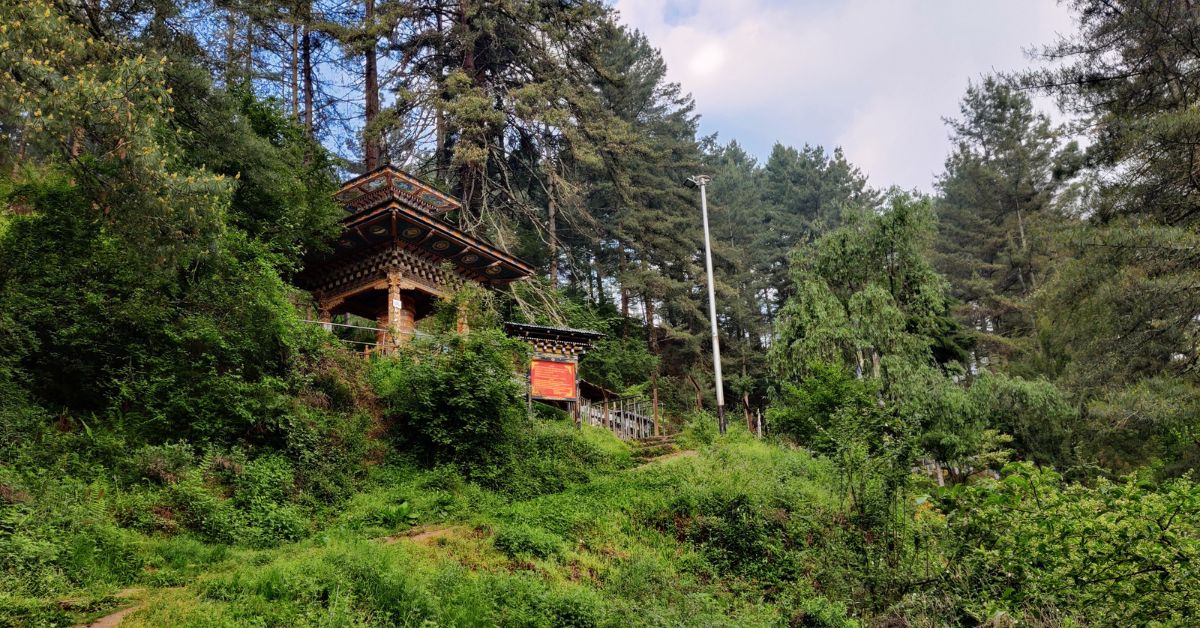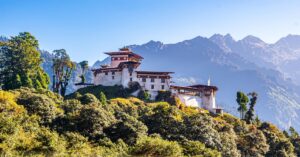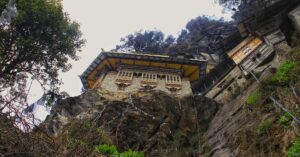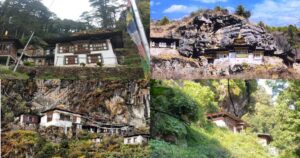Drupchhu or holy spring waters are considered to be blessed water, often extracted from a cliff or a sacred place by a spiritual person. Many holy spring waters in Bhutan are said to have been extracted by Guru Rinpoche. The holy springs may or may not have medicinal value, but are considered to have a great spiritual power to liberate one from suffering if one drinks them.
People have long used holy spring water, or Drupchhu, as a spiritual blessing for drinking and bathing. Many important religious sites in Bhutan have holy spring waters nearby, often attributed to the place’s founder.
In Bhutan, a holy spring water is called Drubchhu. Bhutan has more than 17 holy spring waters (Drubchhu), 10 hot springs (Tshachu), and more than 17 medicinal waters or mineral springs (Menchu). These spring waters are widely recognized as the most popular and spiritually significant.
For generations, the Bhutanese have used holy waters to drink as a blessing and wash to cleanse one’s sins (dig-pa) and defilements (drib). Drubchhu is also carried as a gift for others.
Also Read: Guru Rinpoche in Bhutan: His Visits to Bhutan and Sacred Sites
Bhutanese Beliefs on Holy Spring Water or Drubchhu
There are more than 17 holy water sources distributed all over Bhutan. Holy spring waters in Bhutan are associated with the spiritual power and blessings of Buddhist masters. The spring waters are believed to have been extracted using their power to perform miracles. Many holy spring waters are believed to have been miraculously unearthed by enlightened beings or Drupthobs. It is believed that holy water emerges from the ground due to the blessings of the Buddhas and Bodhisattvas. Thus, Bhutanese believe holy water is sacred and can cleanse one’s sins and defilements.
Some great saints unearth a few holy spring waters in drought-stricken villages afflicted by deadly diseases or in places of legendary and sacred temples. The springs are often found near a holy site and associated with its founder. The Kurjey Drubchhu, for example, is located next to the Kurjey Lhakhang and is believed to have been blessed by Guru Rimpoche.
Some holy waters are known to offer numerous spiritual and medicinal benefits. For instance, the Tsheringma Drubchhu of Tshangkha village in Trongsa district is believed to have been established by the deity of longevity (goddess—Tshe-ring-ma) and thus, drinking or bathing in it is believed to enhance one’s longevity. People also believe that this spring water can produce a melodious voice. The people of Tshangkha village, who live near the Tsheringma holy water, have a particularly melodious voice since it is their primary source of drinking water.
The Dobdrek Drubchhu of Dobji Dzong was unearthed by a Tibetan Saint, Jetsun Milarepa. Another healing water of Bartsham in the east under Trashigang district is Jomorichu Drubchhu, which Ama Jomo said to have blessed. This lake deity is also considered Nor-Lha. This holy spring water is said to bring wealth.
Also Read: Bhutanese Beliefs on Menchu or Medicinal Springs in Bhutan
Holy Spring Waters in Bhutan
- Bartsham Drupchhu
- Dechenphug Drupchhu
- Dhobdrek Drupchhu
- Dhodhey Drak Drupchhu
- Drubthob Nga gi Rinchen Drupchhu
- Jomorichu Drupchhu
- Khamphug Drupchhu
- Khandro Drowa Zangmoi Othoe Drupchhu
- Kurje Drupchhu
- Pelzo Gyem Drupchhu
- Taktshang Drupchhu
- Tamchoe Drupchhu
- Tango Drupchhu
- Terton Peling Drupchhu
- Thuji Drak Drupchhu
- Tsheringma Drupchhu
- Woolha Gyalp Drupchhu
Chemical Compositions of Holy Spring Waters or Drubchhu
The chemical composition of holy spring water can differ depending on its geological origin. The chemical compositions of holy spring waters include sodium, potassium, calcium, magnesium, and heavy metals such as iron, zinc, and aluminum. They also contain chloride, carbonate, bicarbonate, sulfate, sulfide, nitrate, borate, phosphate, fluoride, and iodide. Holy spring waters also have dissolved gases such as nitrogen, oxygen, carbon dioxide, hydrogen sulfide, radon, helium, and other noble gases.
However, no scientific geochemical investigations have been conducted on the holy spring waters of Bhutan to estimate the mineral concentration of these rocks.
Also Read: Chemical Compositions of Hot Springs or Tshachu in Bhutan
Ethnopharmacological Benefits of Holy Spring Water or Drupchhu
The common ethnopharmacological uses of Drubchhu or holy springs are for cleansing sins and blasphemies. Holy water is known for its purging and healing properties. Though all the sacred spring waters are generally used for cleansing, a few are believed to have healing benefits too.
For instance, Dobdrek Drupchhu is used to heal stomach inflammation, headaches, wounds, tumors, warts, and high blood pressure. It is also used as tonic water. Likewise, Kurje Drubchhu at Kurjey Lhakhang is believed to treat eye disorders, wounds, and mental disorders.
Also Read: Kurjey Lhakhang, a sacred site where Guru Rinpoche left his Body Impression
Bartsham and Biddung villages use Jomorichu Drupchhu against tumors, headaches, and general ailments.
Tsheringma Drubchhu is sought to treat throat-related disorders and to promote a melodious voice, while Thuji Drak Drubchhu is believed to be a remedy for people with speech difficulty.
Also Read: Thuji Dra, the Cliff of Compassion, where Phajo had a Vision of Chenrezig
Best Time to Visit Holy Spring Water or Drupchhu
Holy water is a perennial source, seeping from underneath the ground or trickling down a cliff. The volume or flow of water remains consistent and unchanged regardless of the season. There is no better time to visit any holy spring waters in Bhutan. You can visit the holy springs any time of the year. However, Bhutanese people usually visit the holy spring water when they visit the sacred sites associated with it. You can visit holy spring waters in Bhutan with the Bhutan Pilgrimage Package.
Enjoyed reading this blog?




